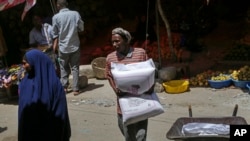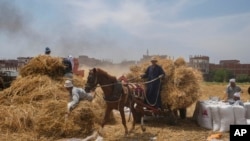Food insecurity is rising globally because of the war in Ukraine, according to experts, with Africa expected to be hit the hardest. The world’s superpowers, China and the U.S., say they are trying to mitigate the fallout but at the same time are accusing each other of exacerbating the crisis.
A state newspaper, The China Daily, placed blame for the situation partially on Washington, saying: “Food prices have reached an all-time high, as Russian and Ukrainian grain exports are hindered by port disruptions and Western sanctions.”
The U.S., for its part, has accused China of hoarding, after President Xi Jinping said earlier this year that food security in China was a primary concern and urged farmers to scale up production to ensure the world’s most populous country was self-sufficient.
Asked by VOA if the Asian giant couldn’t help combat food insecurity caused by the Ukraine conflict, U.S. Ambassador Jim O’Brien, head of the Office of Sanctions Coordination, replied, “We would love to see China act like the large power it is in helping to address the problem in the global food market.”
“We are concerned that China is building up its domestic stocks and continuing to purchase grain on the global market at a time when we would love to see it be able to help those who are in need,” he added.
China has hit back at the accusations of hoarding. “Currently China supplies over 95 percent of its own needs for grain. It is unnecessary for the country to ‘hoard grains’ in the international market,” an article in the state-affiliated Global Times said. “In contrast to China’s contributions to global food security, the U.S. is the major instigator behind the current global food crisis.”
US rebuts sanctions narrative
The worry about global food insecurity began soon after Russia invaded Ukraine in February. Russia and Ukraine are the world’s largest and fifth-largest wheat exporters respectively. Since the war broke out, exports of the grain, as well as maize and sunflower oil, have been severely disrupted.
Many African countries depend heavily on Ukrainian and Russian imports for their food supply, and some say U.S. sanctions on Moscow are to blame for their woes.
Ugandan President Yoweri Museveni said in May, “The war in Ukraine and Western sanctions on Russia have also caused shortages of wheat.”
Likewise, South African President Cyril Ramaphosa has said, "Even those countries that are either bystanders or not part of the conflict are also going to suffer from the sanctions that have been imposed against Russia."
Current African Union Chair Macky Sall, who met with Russian President Vladimir Putin last week, tweeted that the Russian leader was ready and willing to facilitate the export of Ukrainian cereals and suggested the West was hampering him.
“I call on all partners to lift sanctions on wheat and fertilizer,” Sall said.
But at a virtual press briefing organized by the U.S. Embassy in Johannesburg on Thursday, O’Brien said the narrative that sanctions were hurting food exports was misleading.
“The U.S. does not sanction Russian food and fertilizer,” he said. “Russia has disrupted one of the most productive ways that countries received grain. Ukraine used to export 6 million or so tons of grain a month, mostly to the global South. And now that has had to stop; in March and April, it was very small.”
O’Brien said the U.S. and European Union are trying to facilitate exports from Ukraine but that “at best it will probably be about half what it was before, and that’s because Russia has occupied or destroyed 30-odd percent of Ukraine’s grain-producing capability. It is attacking grain storage and processing facilities.”
Cary Fowler, the U.S. special envoy for global food security, said at the same press event, “The situation in the Ukraine has, by all estimates, pushed – is pushing about 40 million additional people into the ranks of the food-insecure.”
Ukraine produces enough food to feed about 400 million people, Fowler said, “and that’s sitting in silos right now in Ukraine, unable to get out” because Russia is blockading the ports.
Resultant food-price spikes are going to have “an impact on Africa first and foremost,” he added. The World Bank said this week that as of June 1, maize and wheat prices were 42% and 60% higher, respectively, compared with January of last year.
More from U.S.
Last month, U.S. Secretary of State Antony Blinken pledged more money to combat food insecurity globally, noting “32 of the 39 countries at greatest risk from this acute food crisis are in Africa.”
“Just since February, the United States has pledged more than $2.3 billion of food assistance. And pending final approval from our Congress, we'll provide more than $5 billion in additional aid, including more than $760 million specifically for global food security.”
As well as the billions in funds, the U.S. is also boosting its domestic fertilizer production, Blinken added. Russia is the world’s largest fertilizer exporter.
Chinese officials have also been speaking about the global food crisis, with some state media, much like the Africa Union’s Sall, blaming Western sanctions.
Chinese Foreign Ministry spokesman Wang Wenbin said last month that China already feeds one-fifth of the global population, the Global Times reported. The report also said China had donated $130 million to the U.N.’s Food and Agriculture Organization “in recent years.”
This week, China’s state news agency Xinhua reported that “African nations can leverage existing collaboration with China to transform their agricultural systems [and] tackle hunger,” attributing it to Quoqi Wu, a senior official at the U.N.’s International Fund for Agriculture Development.
Wu said that, among developing nations, China is the biggest donor to the IFAD and had helped finance numerous projects to boost agricultural best practices on the continent.







